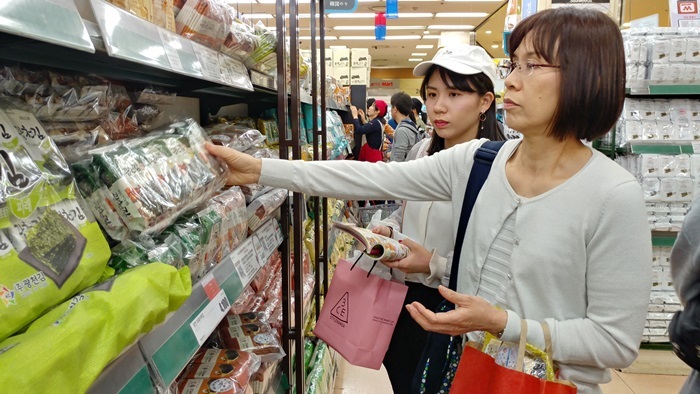
The “Third Korean Wave” has settled across Japan.
The growing popularity of Korean pop music, TV shows and movies in East Asia and elsewhere is no longer just a trend in Japan. It’s part of everyday life for people all across the archipelago.
The popularity of Korean cultural content, like pop music, TV shows, movies and video games, started with the popularity of Korean TV soap operas in Japan. That was the so-called “First Korean Wave.” This expanded to include pop music, forming the “Second Korean Wave.” Nowadays, many different aspects of Korean cultural content, such as pop music, cosmetics and makeup, chatting apps, and food, are all spreading across the Japanese Archipelago. As more and more young people in Japan adopt the fashions, diets and lifestyles of Korean celebrities, major Japanese media outlets, such as the Yomiuri Shimbun and the Mainichi Shimbun, have labeled this phenomenon as the “Third Korean Wave.”
The neighborhood of Myeongdong in downtown Seoul is crowded with Japanese shoppers buying up Korean cosmetics, skin “whiteners” and vividly-colored lipsticks on May 4 during Japan’s Golden Week series of holidays. One of the shoppers said, “I don’t really recognize the style as being ‘Korean,’ because everyone does it nowadays.”
Another shopper, Fujita Saki, said, “I buy clothes directly from Korean websites, and I like to use lip tints from a certain Korean makeup brand.” She added that, “I also study Korean pop music dance three times a week with my friends. K-pop can’t be missed in our leisure time!”

Uchida Mayu, who was using Naver’s messaging app to chat with her friends, said, “I didn’t know that Line Messenger was created by a Korean company. Line has become a major part of Japanese life. We even use the phrase, ‘I’ll Line you,’ instead of, ‘I’ll contact you,’”
In April, it was reported that more than half of the Japanese population uses Line Messenger. Naver Corporation, the Korean search engine and web portal, had set up a Japanese subsidiary for Line Messenger, and now it’s an everyday communication channel for the Japanese people.

Meanwhile at the Seoul Station branch of Lotte Mart, a big box retailer, there were crowds of Japanese tourists sampling and buying Korean food, including cold noodles, hotcakes filled with nuts and syrup, and stir-fried rice cakes in a spicy red sauce.
Ito Mayumi, who was buying some packs of salted laver, said, “Whenever there’s a scene on a Korean soap opera where they eat something, I want to have some Korean food, too. Once every two weeks I make some Korean food, like a glass noodle stir fry or vegetable hotcakes.”
Arai Nobuko, who had a basket full of salted and seasoned laver, said, “Around four days in a week, I eat traditional Japanese fermented soybeans with kimchi or salted laver.” She added that, “Last year, cheese backed ribs were so popular that it was impossible to eat them in Japan without a reservation. Now, we have a lot of cheese backed rib restaurants in Osaka, so I go there all the time.”
Finally, journalist Nidaira Mayumi said, “Japanese middle-aged people started watching Korean soap operas and movies in the 2000s, and their children naturally accepted Korean lifestyles. The popularity of Korean pop music, TV shows and other cultural content in East Asia and elsewhere is not an exotic phenomenon anymore. It’s a general aspect of everyday life for the Japanese people.“.
Source: Korea.net














